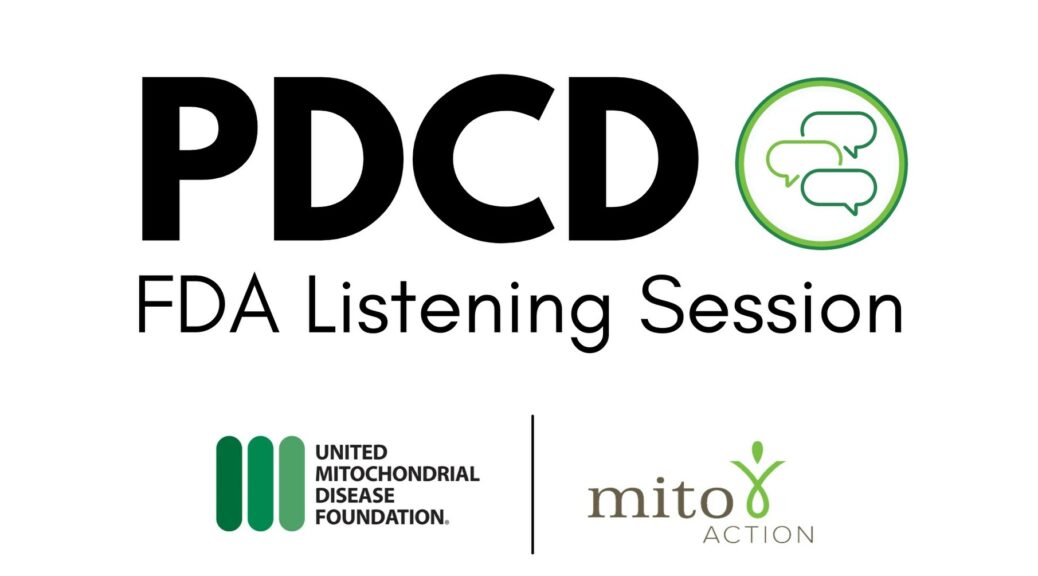“The FDA heard courageous testimony about the toll this disease takes on patients, about the need for improved diagnostic and screening processes, and about the lengths caregivers are going to support the health of their loved ones. Above all, they heard about the urgent need for an approved treatment. Families are doing everything they can with the resources at their disposal, but this is a devastatingly progressive disease. As we work together to make an approved PDCD treatment a reality, it’s vital the process reflects that urgency,” said UMDF President and Chief Executive Officer Brian Harman.
“We thank the FDA for the opportunity to help their staff understand the PDCD community’s experiences and perspectives. It’s crucial that we continue to lift up the voices of expertise – patients, families, clinicians, and researchers – in forums like this,” he added.
Said MitoAction Chief Executive Officer Kira Mann: “As the patient-centered patient advocacy organization, we stand committed to fostering a space where the voices of those affected by mitochondrial diseases like PCDC can resonate. Just as we are dedicated to amplifying these voices, we also acknowledge the paramount significance of empowering patients and caregivers with knowledge about the FDA regulatory process. As advocates, we aim to empower individuals with the tools they need to actively engage in this critical process and ensure their voices are heard, because when patients are informed and engaged, they become a driving force for progress.”
UMDF and MitoAction thank the PDCD community members who bravely shared their stories and the many patient advocacy groups that helped make the listening session a success including Hope for PDCD and The Elizabeth Watt PDCD Research Fund.
Six caregivers to PDCD patients (one of whom is also an affected adult) participated in the FDA videoconference, along with clinician Rebecca Ganetzky, MD, of Children’s Hospital of Philadelphia.
Amongst the testimony heard was Emma, whose daughter Elizabeth is a 20-year-old patient with PDCD.
“As a family, we have lived in a crisis mode for the past 20 years. Constantly worried about death. We have already watched her regress medically and physically, and we fear that every illness will be the one that ends her life. Even minor illnesses can be catastrophic, so we live all day every day in fear. The sad fact is there is not a definitive treatment for PDCD,” she said. “Collectively, we come here today to ask for the hope that all people diagnosed with PDCD will be able to live a long and fulfilling life.”
This was the second FDA Listening Session UMDF and MitoAction have cohosted for a mitochondrial disease in the last 20 months. In January 2022, the FDA held a similar session for thymidine kinase 2 deficiency (TK2d), another rare mitochondrial disease.
ABOUT PYRUVATE DEHYDROGENASE COMPLEX DEFICIENCY
Pyruvate Dehydrogenase Complex Deficiency (PDCD) is a rare mitochondrial disorder that causes impaired carbohydrate metabolism, resulting in neurological problems and a buildup of a chemical called lactic acid in the blood. PDCD is caused by mutations in the genes that make up or affect the activity of the PDC, which is located in the mitochondria that make almost all the energy we need to survive. Nearly all individuals with PDCD experience developmental delay, poor muscle tone, and brain cell loss, which are often accompanied by a host of other issues. Like all mitochondrial diseases, there is currently no FDA-approved treatment or cure for PDCD.
ABOUT THE UNITED MITOCHONDRIAL DISEASE FOUNDATION
Founded in 1996, the United Mitochondrial Disease Foundation (UMDF) works to promote research and education for the diagnosis, treatment and cure of mitochondrial diseases and to provide support for affected individuals and families. Since its inception, the UMDF has funded more than $15 million in research, making it the leading non-governmental contributor of grants focused solely on mitochondrial disease. Every year, UMDF provides support and education to thousands of patients and medical professionals across the globe. Learn more at umdf.org.
ABOUT MITOACTION
Since 2005, MitoAction has transformed the lives of families affected by mitochondrial disease. Our mission is to improve the quality of life for children, adults, and families living with mitochondrial disease through support, education, outreach, advocacy, clinical research initiatives, and granting wishes for children affected by mitochondrial disease. Committed to making the largest impact possible, MitoAction serves individuals in the U.S. and worldwide through support, education, outreach, advocacy, and clinical research initiatives. The programs and services MitoAction provides continue to be a lifeline for families impacted by mitochondrial disease. Families know with MitoAction, they will never be alone on this difficult journey. Learn more at mitoaction.org.
Media Contact
Andy Dearth, United Mitochondrial Disease Foundation, 1 4129799833, [email protected], umdf.org
SOURCE United Mitochondrial Disease Foundation


